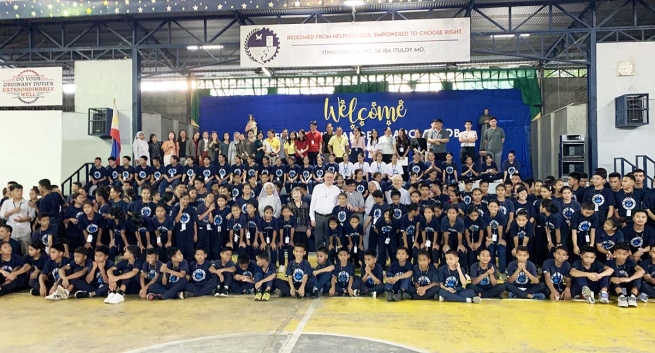Fr Garcia also met with the pastoral team and spoke with its members about the structure of the Youth Ministry Delegation and the challenges they face; the General Councillor provided them with a brief summary of some aspects of Salesian Ministry. He then held a formation session with the rectors of the communities, focusing on the role of the Salesian in the Educative and Pastoral Community. On this occasion he insisted on the skills of the Salesian today, stating that "when we are overshadowed by the role we represent, there is a short circuit. The consecrated life ceases to be a testimony of personal fulfilment and, therefore, of joy." He reminded the rectors that "the Salesian must be a person who knows how to understand and love in the ‘short distances’, who knows how to lead and knows how to open a future. We must enter the ‘airspace’ of young people and let them enter ours, to accompany their process of search for faith and vocational discernment."
The General Councillor also celebrated several Masses and shared the thoughts of the Salesian “good morning” or “good night”, in schools and vocational training centres, as well as in formation houses. In these circumstances he repeated several times that “in the Salesian school we have the opportunity to build our dreams. This keeps us alive and motivated, active and energised. Dreams do not come by themselves; we have to work hard to achieve them, they need time and patience. Important decisions cannot be rushed. Every step must be taken with confidence, but also with constancy, humbly knowing that we cannot build our lives on illusions or easy solutions. God works in our lives through patient chiselling. He is not afraid of long times and does not hurry the steps of those who walk with him; he does not let himself be surpassed in generosity to carry out the work he has begun, even through ways that surprise us.”
Fr Garcia also praised the great work of the Salesians in the nine Technical and Vocational Training Centres and in the 5 reception houses for young migrants, as models of apostolate that respond to the needs of poor young people who are outside the Salesian educational environment. The 13 oratories and youth centres, on the other hand, are potential areas to respond to the needs of young people and to welcome those who are not regular members of structured youth groups. Programs for children in conflict with the law (CICL) and for young adults with disabilities (PWD) were also highly appreciated.
https://www.infoans.org/en/component/k2/item/19438#sigProId50683dc5bb



